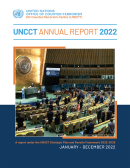Final Evaluation of the Project on Training and Capacity Building of Law Enforcement Officials on Human Rights, the Rule of Law, and the Prevention of Terrorism
The summative independent evaluation of the Global Project ‘Training and Capacity Building of Law Enforcement Officials on Human Rights, the Rule of Law, and the Prevention of Terrorism’, was commissioned by UNOCT in February 2022 to assess overall performance and achievements of the project, as a requirement by the funding partner. The project, launched in 2016 by the UN Counter-Terrorism Implementation Task Force (CTITF) Working Group on Protecting and Promoting Human Rights and the Rule of Law, was implemented by the United Nations Counter-Terrorism Centre (UNCCT) and the Office of the United Nations High Commissioner for Human Rights (OHCHR) from 2016-2022. The evaluation found that the project produced tangible results, with beneficiaries expressing appreciation and satisfaction with the training materials and experts’ competence in human rights and counter-terrorism. It highlighted areas that required additional focus in follow-up interventions and set out lessons to inform future programming. The evaluation recommended, among others, building on the successes of the project by extending trainings, building sustainable partnerships with training institutions in beneficiary countries, promoting gender equity and mainstreaming throughout the design and implementation process, considering programme design from a needs-based perspective, strengthening the role of project governance mechanisms and monitoring systems, and strengthening coherence, synergies and complementarities internally and externally. The evaluation recommendations have been considered and accepted by the Programme Management Team (PMT), as applicable and relevant, in its management response to the evaluation.
The Evaluation Report is available in: EN.
The Evaluation Summary is available in: EN.
The Management Response is available in: EN.











